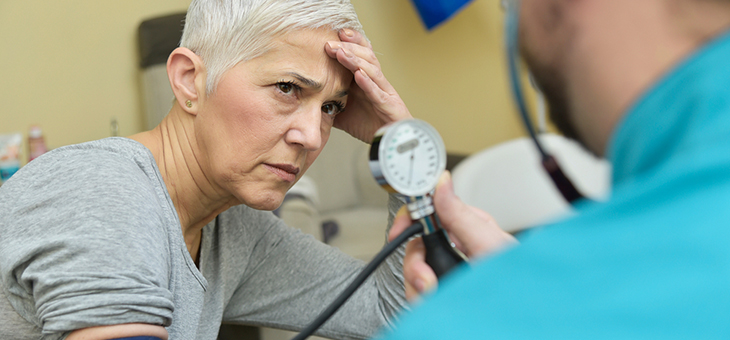High blood pressure, or hypertension, can damage your kidneys, lead to heart disease, heart attack or stroke. Suffice to say, it’s not a good thing to have. So, how do you get it?
Anyone who’s ever had their blood pressure checked will be aware of the upper and lower readings they receive. Your readings are usually presented as a fraction, such as 120/80mmHg (millimetres of mercury). The first (or upper) number, which is also always the higher number, indicates how much your heart is squeezing out blood to your arteries, is your systolic blood pressure. The latter (or lower) number is your diastolic blood pressure, which measures the pressure in your arteries when your heart is relaxed.
A reading under 120/80mmHg is considered optimal, and readings over 120/80mmHg and up to 139/89mmHg are in the normal to high-normal range.
Eating too much salt, being constantly worried or too angry are common factors for blood pressure increases, but there are some lesser known and more surprising things that can raise your BP.
The occasional blood pressure spike won’t do you much harm, but if your BP stays consistently high, you’ll certainly have health problems that can lead to serious damage.
So, keep an eye on the following 14 factors that can raise your blood pressure.
1. Sleep apnoea
If you don’t sleep soundly, your interrupted sleep causes your nervous system to pump out chemicals that increase your blood pressure. And lower oxygen in your blood also makes it difficult for you to regulate your blood pressure.
2. Loneliness
A recent study showed that over four years of disconnectedness, a person’s blood pressure goes up more than 14 points. It’s not just a side effect of depression either. Scientists believe it may be the body’s reaction to a constant fear of rejection, disappointment and having to feel more alert because you’ve only got yourself to look out for yourself. So buddy up for lower BP.
3. Pain
Any form of pain bumps up your blood pressure and gets your nervous system working overtime. Sudden or acute pain can be managed with a couple of painkillers (but see below) while sufferers of chronic pain have a little more work to do to manage their pain and, in turn, their blood pressure.
4. Added sugar
Steer clear of foods containing high-fructose corn syrup, as added sugars in your diet will increase both your upper and lower numbers. High-fructose corn syrup is typically found in soft drinks, lollies, caramel, frozen foods, sauces and condiments, cereals, tinned fruit and juice.
5. Low potassium
Your kidneys need a balance of sodium and potassium to manage the right amount of fluid in your blood. So keeping an eye on your salt intake means nothing if you’re not getting enough potassium. To ensure your levels are okay, eat more fruit, veggies, fish, beans, broccoli and leafy greens, and that famous go-to for the big K: bananas.
6. Herbal supplements
Some herbal supplements, such as ginseng, gingko, guarana, ephedra or St John’s wort, can raise your blood pressure or interact with other medicines, including medicines supposed to regulate high blood pressure.
7. Thyroid imbalance
Thyroid disorders become more common with age. An overactive thyroid gland (hyperthyroidism) makes your heart beat harder and faster, making you feel flighty, and leading to long-term issues, such as breaking down bone density and causing osteoporosis. An underactive thyroid gland (hypothyroidism) makes you feel tired and slows your heart rate, which can cause your arteries to become less ‘stretchy’ (low hormone levels can harden artery walls), allowing blood to flow through far too quickly, and therefore increasing your blood pressure.
8. Not peeing when you need to
A study of middle-aged women showed that systolic pressure goes up about four points and your diastolic pressure goes up about three points if they don’t go to the toilet every three hours. Similar numbers were found in middle-aged men, enough to know that an empty bladder is better for lowering blood pressure.
9. NSAIDS
Nonsteroidal anti-inflammatory drugs, such as common household painkillers containing ibuprofen and aspirin, can cause high blood pressure.
10. Sinus medicine
Sinus sprays and other decongestants containing pseudoephedrine and phenylephrine (found in cough, cold and hayfever meds) narrow your blood vessels and inhibit the passage of blood through your body. These medicines can also have a negative effect on blood pressure medication.
11. Dehydration
If your body’s cells don’t have enough water, they tighten up and restrict the area needed for blood to pass. When you’re dehydrated, your brain sends a signal to your pituitary gland to release a chemical that shrinks your blood vessels. And the less you pee, the more your heart and brain try to squeeze to hold on to the fluids you have in your body.
12. Talking
Every time you talk your blood pressure increases. If the content of your conversation is more emotional, your blood pressure increases more. So stay calm or keep quiet!
13. Antidepressants
Medicines containing dopamine, norepinephrine, and serotonin can manage your mood but can wreak havoc on your blood pressure.
14. Visiting your doctor
Ironically, visiting your doctor for a blood pressure reading can actually increase your blood pressure. It’s called the ‘white coat effect’ and your numbers can increase up to 10 points for your systolic BP and 5 points for your diastolic BP.
Unless you’re running ridiculously high or low numbers, blood pressure doesn’t have any obvious symptoms, so it’s best to have it regularly checked out with your doctor. If you have high blood pressure, they’ll help you manage it.
Read more at www.webmd.com
Do you have high blood pressure? How do you manage it?
Related articles:
Understanding blood pressure
Coping with soaring blood pressure
Blood pressure linked to dementia

